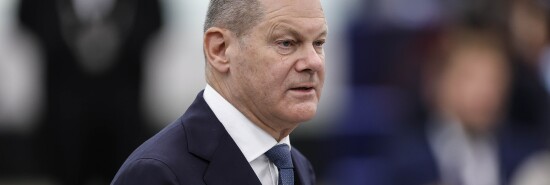
Olaf Scholz tries to play Washington with EU-China speech
Tom Rogan
Video Embed
As part of his address to the European Parliament on Tuesday, German Chancellor Olaf Scholz offered a false olive branch to Washington. He did so seeking to placate U.S. concerns that Berlin is too closely aligned with Beijing.
“Our relations with China are accurately described as being threefold,” Scholz said, “with China as our partner, competitor, and systemic rival — although rivalry and competition have certainly increased on China’s part. … I agree with [European Commission President] Ursula von der Leyen: The way forward is not through decoupling but smart de-risking.”
This “rivalry and competition have certainly increased on China’s part” line is a play to Washington. Scholz is aware that the United States regards von der Leyen as the key checking influence on French President Emmanuel Macron’s preferred European Union China policy. A checking influence on Macron’s trade-at-all-costs China policy. Von der Leyen recently argued that the EU needed to restrict Chinese access to the EU’s critical infrastructure and high-tech goods exports. In contrast, Macron has all but said that France will bow before China on Beijing’s priority concerns (Taiwan, human rights, etc.) just as long as Beijing keeps its investment spigot running into France.
The problem for Washington, however, is that Scholz has no real interest in the substantive policy changes that would put teeth on von der Leyen’s agenda. What would teeth look like?
Well, something like the kind of leadership that German foreign minister Annalena Baerbock offers. Baerbock, who leads the second-largest party in Scholz’s coalition government, has challenged the traditional third rail of German foreign policy. Namely, Scholz’s group-think aligned view that as long as China maintains its trade privileges for German car manufacturers, it can do no wrong. In Berlin on Tuesday, Baerbock directly pushed back against threats by the visiting Chinese Foreign Minister Qin Gang that Beijing would not tolerate the EU’s imposition of sanctions on Chinese corporations that are circumventing sanctions imposed on Russia. This unequivocal rejection of Chinese threats is something China rarely sees. But a unified EU that stood for its values, security, allies, and a more pragmatic trading relationship in its dealings with Beijing would not be one that Beijing could intimidate.
Instead, Scholz talks the talk but won’t walk the walk.
In an absurd example of his mismatch between words and action, Scholz also suggested during his speech that the war in Ukraine is “a question of enduringly safeguarding peace in Europe following the ‘Zeitenwende’ of Russia’s war of aggression.”
Again, it sounds good. But again, the devil is in the details. That “Zeitenwende” term (meaning “turning point”), after all, is the phrase Scholz used to frame his February 2022 pledge of a $110 billion emergency boost to Germany’s long-deficient defense budget. (Though Germany has Europe’s largest economy, it is one of the lowest defense spending and least reliable NATO members.) Yet, as with Scholz’s new rhetoric on China, the Zeitenwende rhetoric is belied by its absent action. That $110 billion has not been spent, and, more than a year after Scholz’s pledge, German defense spending remains far lower than NATO’s 2%-of-gross domestic product target.
But perhaps the best proof of Scholz’s unseriousness about getting a little tougher on China is, well, China.
Take the editorial that Beijing’s Global Times propaganda newspaper offered on Tuesday. It came from the Global Times, which gets fed its talking points from the powerful Central Foreign Affairs Commission. Celebrating Scholz’s invitation to Macron for a state visit this summer, the newspaper complimented Macron and Scholz on their recent visits to China. The Global Times concluded, “We are pleased to see the restart of the ‘close friendship’ between France and Germany, and we also hope that Europe can walk steadily on the path of strategic autonomy.”
Put simply, Scholz might want Washington to believe he is serious about taking a slightly-tougher-than-absolute-appeasement stance toward the greatest adversary of human freedom and rule-of-law-rooted prosperity in the 21st century. But measured by his actions and China’s overt assessments, Scholz remains very much rooted in the Macron school of China foreign policy. Which is to say, strategic prostration.
